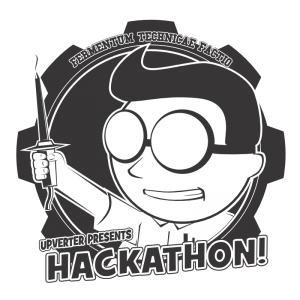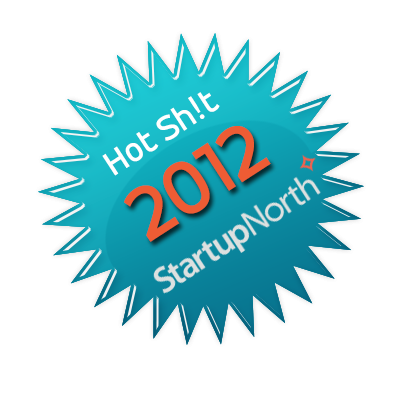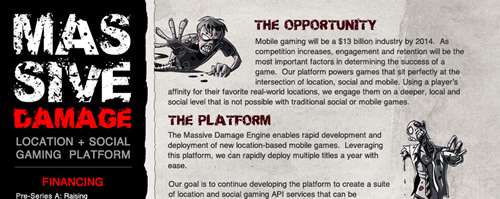Rob Go published his Hitchhiker’s Guide to the Boston Tech Community, and it got me thinking about how much of the Toronto Tech scene has changed over the years. This is a my view of the players and contributors in the Toronto Startup Ecosystem. It is not a comprehensive list. It’s designed to be an overview. If you want more detail, seek it out.
The first rule of this community is:
” Create more value than you capture.” – Tim O’Reilly
If you can’t figure out how to add value, then you are doing it wrong. It probably means that you’re ruining the experience for someone else.
Monthly/Semi-Regular Events
- Mentor Mondays – hosted by Howard Gwin of OMERS Ventures. Probably the best networking event for funded and looking to get funded startups. Includes Howard’s network of CEOs, founders, consultants and other crazies that can provide real world advice. This is the best CEO event in the city if you can get an invite.
- Founders & Funders – An invite only event hosted semi-regularly by use here at StartupNorth. It’s designed to bring together the people the start high potential growth companies and the people that fund them. It is invite only, requirements vary if you are a founder or a funder. For funders, we like to see 2 investments of >$100k in the past 12 months, and we try to vette founders to be fundable (and we’re often wrong)
- SproutUpTO – Hosted by Jon Spencely and the Sprouter crew. Roughly monthly meetup that follows the startup demos and a big name keynote speaker. Event is approximately $12 to attend. Has hosted big names like: Daniel Burka, Tony Conrad, Matt Meeker, Sean Ellis, and others. Many of the keynote speakers and the startups are “high potential growth technology companies” but I find that the audience and the networking is mixed.
- TechTalksTO – Great semi-regular series of talks by technologists for technologists.
- StartupGrind TO – Semi-regular access to startup speakers including Paul Singh, Eric Migicovsky, and others
- Ladies Learning Code – focused on teaching development skills to newbies (of all genders).
- DevTO – monthly developer educational events. Broad focus on industry trends and specific development environments.
- Creative Mornings TO – Monthly breakfast series for creative types. Tends to aim more agency side but a great show.
- Pecha Kucha TO – Pecha Kucha is the format that started it all. 20 slides x 20 seconds. It’s another event that tends to be aimed more at designers and agency folks. Presentations are always interesting.
- Third Tuesday Toronto – Primarily for communications professionals (think PR and media types) with a focus on digital media and emerging best practices.
- DemoCamp – I have hosted DemoCamps since 2005. They started as a way for entrepreneurs, developers and designers to get together and share what they’ve been working on. They grew to >500 person networking events. There are currently no plans to host anymore.
Smaller Events & Meetups
- Toronto Ruby Brigade – Great learning series primarily aimed at beginners, but becoming more advanced, includes book club series, hack nights at Influitive, and lessons/lectures about specifics of building and craft in Ruby.
- Rails Pub Nite – Totally a social event. It’s a great way to figure out who is hiring in the Ruby scene and to meet others using Ruby. Hosted by the Unspace crew at the Rhino on Queen Street West.
- Django/Python Toronto – This is a set of crazy Python devs. It is also not for the “recruiters” or bullshit artists. Go if you are using or considering Python on a project and you want to talk to the best. And don’t be a douchebag.
- HTML5 Web App Developers – This is an educational event. It is broadly HTML5 and web app technologies. But the sessions are well put together and cover the craft. Good beginner through advanced.
- Hacks/Hackers Toronto – The intersection of journalists and technologists. This is a very strong community. But it is really focused on the intersection of journalism and new tech.
- StartupDrinks Toronto – A monthly social for entrepreneurs. Most recently hosted at Hotel Ocho on Spadina between Queen & Dundas. It’s noisy. I cofounded the event, though I don’t attend very often anymore. I don’t find that I benefit from the networking. And if I really wanted to drink with friends, well I do that.
- NerdLearn – I have never been. It is hosted by The Working Group and Dessy Daskalov Follow @dess_e who I think is amazing. I’m still bummed out that she turned down my job offer.
- TiE Toronto – Interesting with Haroon Mirza as part of the organization committee. Great mentoring group with startups like Cognovision and Verold participating the in the recent past.
- MobileStartupsTO
- LeanCoffeeTO – These happen regularly, every Tuesday at 8am. I don’t find a lot of value in the discussions. So maybe I’m doing it wrong. If you are new to the lean methodology, or you just want to talk with other entrepreneurs that are using lean.
- Hadoop User Group – Relatively new event. People look awesome. Focused on Hadoop, Map/Reduce and data science. I think it’s going to be good.
- GeekGirlsToronto – Great networking group aimed at connected geek girls, tech savvy women in the GTA. Events cover everything from women founders to Arduino.
Annual Events & Conferences
- Canadian Innovation eXchange (CIX) – This i An event hosted by Achilles Media, has proved to be a launching ground for some of Toronto’s best acquisitions.
- HoHoTO – Annual holiday party. It is a must attend event.
- TiE Quest – hosted annually. $50k non-dilutive prize. Hosted at MaRS. Previous winners include Cognovision.
- TEDxToronto – Annual event using the TEDx. Great community production.
- Mesh – Could be described as the grand daddy of Toronto 2.0 events. Usually happens in the spring. Mesh is a 2 day event that focuses on how the web is evolving and affecting every part of our lives: government, policy, marketing, entertainment, etc. Produced by Mark Evans, Rob Hyndman, Stuart MacDonald, Mathew Ingram and Michael McDermett.
- OCE Discovery – Event aimed at government support of local innovation. I have paid for a ticket in the past, particularly when they’ve had keynote speakers I wanted to hear. But generally this is an event for those connected with OCE. Next one will be May 27 & 28, 2013. Strong focus on companies that have been supported by OCE with strong manufacturing, ICT, and healthcare showing.
- ThroneOfJS – was the latest in a series on Ruby and Javascript events hosted by the Unspace crew. Prior to Throne of JS, the Unspace crew hosted Future Ruby. These are great local events with world class talent.
- AccelerateTO – hosted by the C100. Great social event. Keynote at the last one was from Google Canada, interesting but not stellar.
- AndroidTO – hosted by the BNOTIONS crew. 3rd year. Focused on education around mobile development.
Online Resources and Newsletters
- StartupCFO
- The C100
- Version One Ventures Resources
- Quora – Startups in Toronto
- StartupDigest Toronto
Recruiting Resources
- StartupNorth Jobs
- TechVibes Technology Jobs – More expensive than StartupNorth but I have had good results from my postings.
- Quora: Which Startups are hiring in Toronto?
- Craigslist: software, web and other boards.
- GrossmanDorland – I have worked with Bruce on and off. He consistently puts high value candidates that I want to hire in front of me.
- Waterloo Tech Jobs – I have never posted.
- StackOverflow Careers – I have never had a lot of luck using StackOverflow Careers.
University, Government & Not-for-Profit Resources
- Rotman VentureLab (though I hear it’s being renamed the Creative Destruction Lab)
- Ryerson Digital Media Zone
- Interactive Ontario
- MaRS
- Investment Accelerator Fund (IAF)
- UofT Web Startup Society
- Next36
- Ontario Centres of Excellence – support for spin-outs from university / college and research hospital technologies
- RIC Centre – smaller than and leverages MaRS based in Mississauga, ON part of the ONE Network
- ventureLAB – smaller than and leverages MaRS based in Markham, ON part of the ONE Network
- OMDC – check out the Ontario Interactive Digital Media Tax Credit a lot of gaming studios qualify for tax incentives.
Coworking Spaces and Accelerators
- Extreme Startups
- InCubes
- JoltCo
- Bento Miso
- Driven
- Multiplicity
- Garrison Health Technology Ventures
- MaRS Commons
- Kinetic Cafe
- Camaraderie
- Locus Quo
- ING DIRECT Cafe
- Foundery
- WorkplaceOne
- Longbranch Coworking
Entrepreneurial Design & Development Firms
- Endloop Studios – Mobile development
- Jet Cooper – user experience & product design
- Teehan+Lax – user experience & marketing
- nulayer – Rails and Javascript
- Big Bang Technology – Rails and Javascript
- Unspace – Rails and Javascript development
- Xtreme Labs – Mobile development
- BNOTIONS – Mobile and web development
- OkGrow! – Rails and Javascript
- The Working Group – Rails and javascript
- Nascent Digital – mobile and emerging tech like MS Surface
- HeroPixel – user experience and product design
- List of Toronto Mobile App Development Companies in Toronto by Zeus River
Canadian Investors
- Howard Gwin Follow @howardgwin OMERS Ventures
- Boris Wertz Follow @bwertz Version One Ventures
- Matt Golden Follow @mattgoldenvp Golden Ventures
- Mark MacLeod Follow @startupcfo Real Ventures
- Scott Pelton Follow @spelton Round13
- Roger Chabra Follow @rchabra Rho Ventures
- Derek Smyth Follow @derekjsmyth OMERS Ventures
- Andy Yang Follow @andyyangstar Extreme Ventures
- Robin Axon Follow @robinaxon Mantella VP
- Brian Kokus Follow @bkobus Summerhill VP
- Kevin Talbot Follow @talbot Relay Ventures
- Karamdeep Nijar Follow @karam_n iNovia Captial
- Daniel Klass Follow @klassCapital Klass Capital
- Sandy Scott, Tandem Expansion
- Justin Lafayette, Georgian Partners
- Brian Antonen, Celtic House Venture Partners
- Tim Lee or Andrew Pinkerton, GrowthWorks
- Greg Wolfond, Bluesky Capital
- Jesse Rasch, Hedgewood Capital
Places to Hang
- Sense Appeal – Great coffee. Lots of folks from Mozilla Toronto, ChickAdvisor, Nascent Digital and others.
- Dark Horse on Spadina – It’s downstairs from the Centre for Social Innovation. Lots of
- Jimmy’s Coffee – Very likely to run in to Rocketr, Jet Cooper, EndLoop Studios, Guardly or Massive Damage.
- HackLab.to – great hacker space in Kennsington Market, and you’ll see something that will blow your mind, guaranteed. More anarchist hacker than startup entrepreneur. But its an amazing collective of people.
Journalists and News
- Mathew Ingram Follow @mathewi – Not Toronto focused. But leading journalist in emerging tech based in Toronto.
- Mark Evans Follow @markevans – Toronto focused. Social media, marketing and startups.
- Financial Post Tech Desk
- Matt Hartley Follow @thehartley
- Christine Dobby Follow @christinedobby
- Darrell Etherington Follow @drizzled – Writer at TechCrunch, covering Apple and startups.
- Rob Lewis, Knowlton Thomas and the crew at TechVibes
- BetaKit– Not Toronto focused but based here.
- Erin Bury Follow @erinbury
- Amber MacArthur Follow @ambermac– Writer for Fast Company, The Globe & Mail, on air personality for BNN, CityTV and others.
- BNN’s The Pitch
- BlogTO’s Tech section also provides great coverage.
- Toronto Life has covered the startup scene. Monthly publication with more focus on “society” than anything else.
Looking for Offices Space?
- I used Jay Littlejohn at Cushman & Wakefield. He helped Influitive and others.
- Centre for Social Innovation with 215 Spadina and the Annex has great brick and beam space.
- BNOTIONS has a large space in St. Lawrence Market. They are actively looking for sublet tenants.
- Companies are located all around Toronto.
- Wave Accounting is near Queen & Carlaw
- Wattpad is near Yonge & Sheppard
- Top Hat Monocle is near Yonge & College
- There is a big cluster near Queen & Spadina: Influitive, Guardly, Extreme Startups, Endloop Studios, Jet Cooper, Rocketr, Unspace, BuzzData, Big Bang Technology, The Working Group, and more.
- Facebook Canada is near Yonge & Eglinton
- Dayforce is located near Yonge & York Mills
- Xtreme Labs is near Yonge & King St.
Scaling Companies to Watch (probably hiring)
- Wave Accounting
- Wattpad
- FreshBooks
- Influitive
- Top Hat Monocle
- Achievers
- FixMo
- 500px
- ClearFit
- ScribbleLive
- Polar Mobile
- Nulogy
- Chango
- Idee
- Well.ca
- Shopify
- Kontagent
- Vidyard
- Kik
- TribeHR
- Uken Games
- Desire2Learn
Some to Follow
- Upverter
- Engagio
- Massive Damage
- ShopLocket
- cream.hr
- HealthAware
- Rocketr
- Shopcaster
- ChickAdvisor
- Try Relay
- Viafoura
- BuzzData
- Guardly
- Uberflip
- Careerify
- AppHero
Entrepreneurs, Thought Leaders, Gadflys and Others
- April Dunford Follow @aprildunford – April is probably the best marketer in Canada. If you are a startup and you are marketing, thinking about marketing or just want to learn about marketing go read her stuff. She’s the BEST.
- John Philip Green Follow @johnphilipgreen – John is an EiR at Hedgewood. In the past he was the CTO at CommunityLend/FinanceIt.ca. He was also the founder of LearnHub. His style is second to none.
- Zak Homuth Follow @zakhomuth – Founder of YC alumni Upverter.
- Farhan Thawar Follow @fnthawar – VP Engineering at Xtreme Labs. Absolutely amazing. I think he’s Hot Shit.
- Jonas Brandon Follow @jonasbrandon – My friend and cofounder of StartupNorth. He’s been in at least 2 deals I wish I listened to him on.
- Amar Varma Follow @avarma – Founder of Xtreme Labs, Extreme Venture Partners, hustler extraordinaire.
- John Ruffolo Follow @ruffoloj – Runs OMERS Ventures, previously at Deloitte & Touche. Connected at all levels.
- Howard Gwin Follow @howardgwin – I’ve referred to Howard as the best VC in Canada. He has the midas touch.
- Matt Golden Follow @mattgoldenvp – New fund. Making waves. He’s going to go far.
- Mark Organ Follow @markorgan – Founder of Influitive. Just raised a massive round. Previously founder of Eloqua.
- Mike Beltzner Follow @beltnzer – Director of Product at Wattpad. Previous ran Firefox at Mozilla.
- Mark Surman Follow @msurman – Director of Mozilla Foundation. Unbelievably forward thinking in technology, community and family.
- Scott Pelton Follow @spelton – I think Scott had the best IRR of any Canadian VC. He’s kicking off Round13. Someone to watch once the fund is closed.
- Sandy Scott – Partner at Tandem Expansion Capital. Time in Boston and Silicon Valley. HBS. Very smart.
- Sue McGill Follow @suemcgill – Executive Director of JoltCo accelerator at MaRS.
- Krista Jones Follow @KJatMARS – Practice Lead for ICT or ICE at MaRS
- Andrew Peek Follow @drupeek – Founder of Rocketr, previously at Freshbooks.
- Andy Yang Follow @yangstar – Andy runs Extreme Startups. They had a small but amazing first class.
- Satish Kanwar Follow @skanwar – Founder at Jet Cooper. Founder at Lean Coffee TO.
- Chris Eben Follow @ceben – Partner at The Working Group. Organizer of StartupWeekend.
- Derek Smyth Follow @derekjsmyth – Partner at OMERS Ventures. Doing amazing deals. He’s the work horse.
- Roger Chabra Follow @rchabra – Partner at Rho Ventures. Dividing time between Montreal, Toronto, SF, NYC, and other places. New fund. Very stylish.
- Sunil Sharma Follow @ExtremeStartups – Connector at Extreme Startups. Connected to more people than are in Canada.
- Allen Lau Follow @allenlau – Founder and CEO of Wattpad. Big vision. Just raised from Khosla Ventures, Union Square and GoldenVP.
- Kirk Simpson Follow @tksimpson – Founder and CEO of Wave Accounting. Big raise from CRV, Social+Capital, and OMERS.
- James Lochrie Follow @jameslochri – Product lead and founder at Wave Accounting.
- Adam Goucher Follow @adamgoucher – Principal at Element34. Focused on Q&A and testing. Wrote Beautiful Testing.
- Greg Wilson Follow @gvwilson – Founder of Software Carpentry. Loves the Python. Former CS prof at UofT. Wrote Beautiful Code.
- Heather Payne Follow @heatherpayne – Founder of HackerYou and Ladies Learning Code.
- Kunal Gupta Follow @kunalfrompolar – Founder of Polar Mobile and Impact at UW.
- Joseph Puopolo Follow @jpuopolo – Founder of Printchomp. Previously at StickerYou
- Mark McQueen Follow @MarkRMcqueen – President & CEO of Wellington Financial, Chair of the Toronto Port Authority. Great blog focused on Canadian growth captial.
- Daniel Debow Follow @ddebow – Founder of Rypple. Part of the Workbrain diaspora.
- David Ossip Follow @dossip – Founder of Dayforce, Workbrain and other ventures.
- Richard Reiner Follow @richardreiner – Angel investor and operator. Founded security firm Assurent. Sold eNomaly.
- Saul Colt Follow @saulcolt – The Smartest Man in the World. A great PR/media hacker. Expert at word of mouth and social media.
- Amber MacArthur Follow @ambermac – Entrepreneur, television host, podcaster. Writes for Fast Company.
- Leila Boujnane Follow @leilaboujnane – Founder of Idee and TinEye. Often host of DemoCamp, GeekGirlToronto and other events. Wickedly smart.
- Jesse Rodgers Follow @jrodgers – Founder of TribeHR, former director of UW Velocity, now running Rotman Venture Lab. Strong insights in to incubator metrics.
- Dan Servos – CEO of Locationary. Previously sold SocialDeck to Google.
- Rob Hyndman Follow @rhh – Awesome startup lawyer. Founder of Mesh.
- Mark Evans Follow @markevans – Former/sometimes current journalist. Consultant focused on startup marketing and media communications. Founder of Mesh
- Michael McDerment Follow @MikeMcDerment – CEO and Founder of Freshbooks. Founder of Mesh
- Rick Segal Follow @RickSegal – Founder of FixMo. Previously VC at JLA Ventures.
- Ali Ghafour – Founder and CEO of ViaFoura
- Suresh Bhat – Associate at ExtremeVP
- Bram Sugarman Follow @bramsugarman – Associate at OMERS Ventures. Previously at Uken Games and Extreme Ventures.
- Damien Steel Follow @damiensteel – Senior Associate at OMERS Ventures
- Jennifer Lum Follow @jenniferlum – Cofounder Adelphic Mobile, previously at Quattro Wireless. Extreme Startups mentor.
- Estelle Havva – Industrial Technology Advisor at IRAP. Been involved in this community since the beginning. Practical and can help you with IRAP
- Ilse Treurnicht Follow @IlseTreurnicht – CEO of MaRS. Big budget, big real estate, big salary and hopefully big impact.
- Albert Lai Follow @albertupdates – Working on Big Viking Games, previously Kontagent, Bubbleshare and others. Original cohost of DemoCamp with me.
- Ali Asaria Follow @aliasaria – Founder of Well.ca, creator of Brickbreaker. Just awesome.
- Tonya Suman Follow @tonyasurman – Centre for Social Innovation. World leading thinker and doer on social innovation and community ecosystem. Based here in Toronto.
- Pete Forde – Founder of BuzzData, Unspace and other things. Photog, audiophile, and all round great guy.
- Jay Goldman Follow @jaygoldman – Jay has moved on to Klick Health. Jay founded Radiant Core, did the UI for Firefox 2.0, helped build ZeroFootprint. If you can get his time to talk social or product, it is worth it
- Jon Arnold Follow @arnoldjon – Big in the telco and smart grid space.
- William Mougayar Follow @wmougayar – CEO of Engagio. Previously Equentia. The man and the product allows him to participate in comment conversations across the web. Responsible for helping bring Fred Wilson to Toronto.
- Follow @heygosia – CEO and founder of LearnHub. Technical, product, leadership, growth. She’s amazing. Doesn’t get enough credit.
- Jim deWilde Follow @jimdewilde – Teaches in B School. Wrote much of the policy on innovation, government fund of funds, key behind the scenes player. Plus he’s awesome.
- Zach Aysan Follow @zachaysan – Big data guy. Currently 500px. Previously Algo Anywhere and Rocketr.
Waterloo
- Communitech Follow @communitech
- Michael Litt Follow @michaellitt – CEO and founder of YC alum Vidyard
- Ted Livingston – CEO and founder of USV-backed Kik. Ted also donated $1MM to the University of Waterloo.
- Enflick
- Joseph Fung Follow @josephfung – Founder & CEO of Matrix Partners & Relay Ventures funded TribeHR
- Accelerator Centre
- UW Velocity – Student Residence and shared office space that has produced venture funded companies including Allerta, Vidyard, and others
- Randall Howard Follow @randallh
- Carol Leaman Follow @CarolLeaman – CEO of Axonify. Just won the Forbes Startup Idol. Raised a massive round from Bridgescale Partners and IAF. Previously CEO of PostRank sold to Google.
- Desire2Learn – Just raised a massive $80mm round from OMERS & NEA













